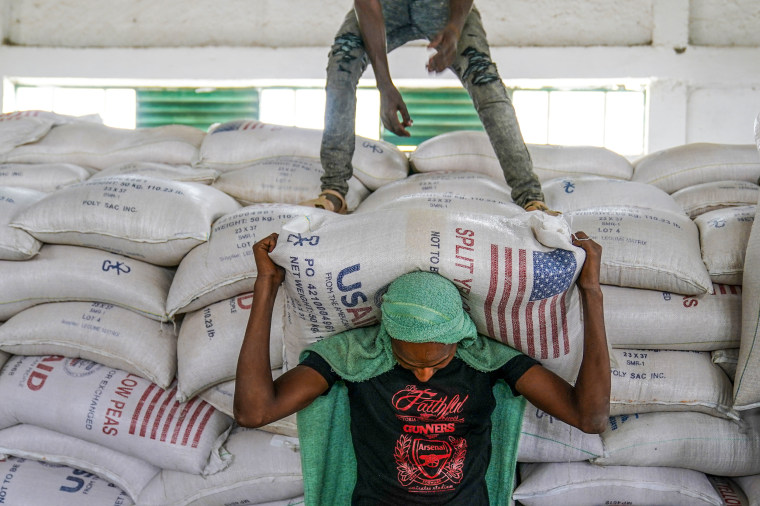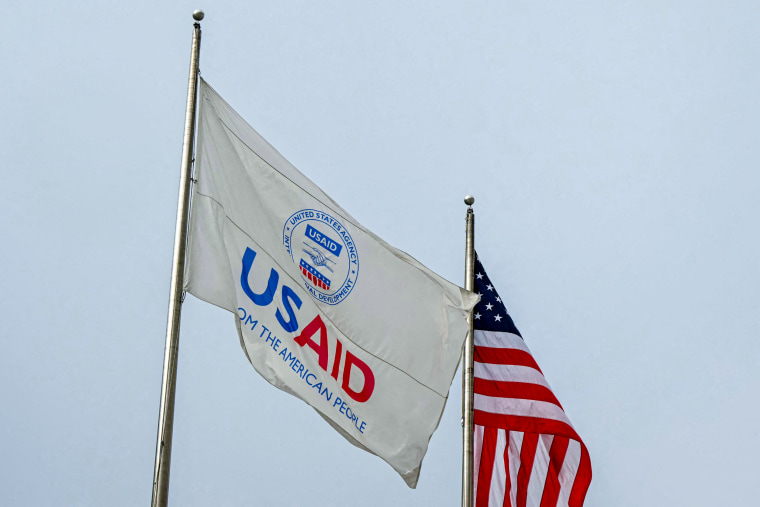Trump’s USAID overhaul halts global aid, some food and medicine stuck in ports
Shipping containers packed with lifesaving antibiotics and antimalarial drugs are being held at the Port of Sudan, where they sit in limbo. Essential medicines are expiring in the Democratic Republic of the Congo after a cash-strapped government contractor was forced to shut off the air conditioning. Millions of pounds of American-grown soybeans that were bound for refugee camps overseas are being diverted to warehouses instead.
President Donald Trump’s mission to upend the U.S. Agency for International Development, a government organization tasked with alleviating global poverty and providing humanitarian relief, has paralyzed efforts to distribute essential food, medicine and other lifesaving supplies around the world, according to nonprofit organizations, farm industry groups and federal lawmakers.
The administration’s 90-day freeze on foreign aid, a stop-work order to review agency operations and the abrupt closure of USAID’s headquarters have stalled the aid distribution system, despite the administration’s claim that “life-saving humanitarian assistance” would be allowed to continue.

USAID delivers billions of dollars in humanitarian aid overseas, funding that advocates say provides a critical lifeline to more than 100 countries at only a small fraction of the overall federal budget. It’s not clear how much money in aid is tied up, or how long the pause may last.
The agency’s future is now deeply uncertain; Trump has seized on it as part of his mission to radically reshape the federal government, saying it was “run by a bunch of radical lunatics,” and the agency’s spending and staff must be scrutinized. The State Department took control of USAID this week.
There are layers of problems. The process to apply for a humanitarian waiver is new and mired in confusion and delays. According to nonprofit groups, it’s not clear how the administration is defining “lifesaving” aid that can continue despite the freeze, or whether the holdups in releasing funds are intentional.
“For more than a week now, essential lifesaving programs and commodities like food and medicine have been stopped,” said Tom Hart, president and CEO of InterAction, an alliance of U.S.-based nongovernmental organizations, many of which rely on federal aid to fund their work. “That’s a massive waste of taxpayer money and goodwill, as well as devastating humanitarian impacts on people in need.”

Even aid groups that have received the waivers to distribute lifesaving HIV medication have been unable to draw down funding from the federal government’s payment system, hampering their ability to distribute the medicine, he said.
We’re looking to hear from federal government workers and contractors. If you’re willing to talk with us, please email us at tips@nbcuni.com or contact us through one of these methods.
Some shipping containers full of aid materials already en route to their destinations are being diverted to warehouses and held at ports in the U.S. and overseas, caught up in the confusion, according to farm industry groups.
That includes about 33,000 metric tons of soybeans and soy products used to treat severe malnutrition in East Africa and other regions, according to Gena Perry, who leads a human health program for the American Soybean Association, an industry trade group.
“There’s a carveout for emergency feeding, so that’s supposed to be flowing through, yeah?” said Joe Cramer, director of the Michigan Bean Commission, which represents domestic bean growers. But he said that hasn’t been happening. “There’s a freeze on shipping anything,” he said.
The confusion around delivering essential food and medicine has drawn rare criticism from Republican lawmakers, as well as Democrats.
“I urge @SecRubio to distribute the $340 million in American-grown food currently stalled in U.S. ports to reach those in need,” Sen. Jerry Moran, R-Kan., wrote on X. “Time is running out before this life-saving aid perishes.”
Sen. Bill Cassidy, R-La., urged the Trump administration to resume the distribution of HIV drugs under a decades old initiative to fight HIV/AIDS.
“It is a Republican initiative, it is pro-life, pro-America and the most popular U.S. program in Africa,” Cassidy wrote on X. “There’s even a waiver acknowledging this, yet I’m told that drugs are still being held at clinics in Africa. This must be reversed immediately!!”
The State Department did not respond to a request for comment. Spokespeople for Moran and Cassidy said there were no updates.
The breakneck effort to stymie USAID has prompted many humanitarian groups to suspend their work entirely. Others have scaled back services while struggling to stay financially solvent as USAID has stopped payments — including those for services already rendered.
A senior leader of one humanitarian organization said their group was owed nearly $50 million from USAID for work completed in December and January.
“We have essential medicines rotting in warehouses in the DRC because we can’t operate the air conditioning,” said the staff member, who spoke on condition of anonymity over fears of retribution. “We can’t continue to front money.”
The group also said it had $500,000 worth of antibiotics, antimalarial drugs and other essential medicines currently stuck at the Port of Sudan because of the Trump administration’s stop-work order.
Hart, the CEO of InterAction, corroborated the group’s account.
Kaleb Brownlow, a former senior USAID adviser, said there could be serious health implications from suddenly stopping medication like HIV antiretrovirals, including higher viral loads and the development of drug resistance.
“There’s more viral particles circulating your body, which causes an impact to your own self, but also means that you can spread the disease and increase the likelihood of transmission,” said Brownlow, who was among the hundreds of USAID workers who were laid off last week.
Brownlow described his final days of work as a “complete scramble” as colleagues tried to redirect HIV, malaria and tuberculosis medication to warehouses around the globe.
“There was no attempt to actually phase this out — this was just a complete abandonment,” said Brownlow.
CORRECTION (Feb. 4, 2025, 7:14 p.m. ET): A previous version of this article misstated the first name of a former senior USAID adviser. He is Kaleb Brownlow, not Karl Brownlow.
You may be interested

Spanish ministers agree to cut legal working week to 37.5 hours
new admin - Feb 05, 2025MADRID — Spanish ministers agreed on Tuesday to cut the legal working week to 37.5 hours with no change in salary, forging ahead with one of…

Boden’s £98 trousers knocked down to £29 as shoppers buy ‘all colours’
new admin - Feb 05, 2025If you're in search of the ultimate pair of work trousers to wear to the office throughout the year, make…

Why Quaker groups are suing Trump administration over ICE arrests
new admin - Feb 05, 2025Why Quaker groups are suing Trump administration over ICE arrests - CBS News Watch CBS News Quaker groups have filed…




































